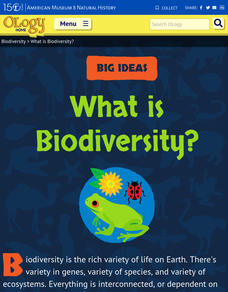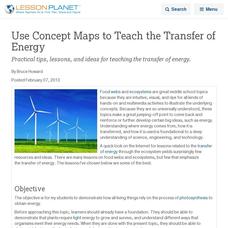Curated OER
The Seasons
Students identify seasonal changes. In this seasons lesson, students choose a tree on the playground to observe each season. Students record their observations throughout the year and create personal seasonal booklets.
Curated OER
Where in the World? Biomes of the Earth
Learners research a biome. In this biomes of the Earth lesson, students discuss what they already know about ecology and view pictures of different biomes. Learners work in groups to research a different biome. Students use the...
Curated OER
Do I Add? or Subtract?
Fourth graders read a book. In this word problems lesson, 4th graders review the operations addition and subtraction, read the book Sea Sums, learn strategies for determining if they should add or subtract, and solve story problems,
Curated OER
What does 'Endangered' mean?
Students discuss a variety of teacher led discussion questions about what makes an animal endangered. They take a short field trip to an open area and set a boundary for each child for them to either write or draw about how the location...
Curated OER
Bioinvasion
Young scholars examine the role of organisms when they eliminate the native species of an area. They review cooperative and competitive relationships within an ecosystem.
Curated OER
Photosynthesis
For this photosynthesis worksheet, students are given a diagram of photosynthesis and words that correlate with the process. They use the words to fill in the blanks about the process and the structures involved in photosynthesis.
Curated OER
Science in the Garden
Students examine soil from their local environment. For this garden lesson, students recognize the importance of soil in the garden. Students explore the contents of the local soil.
Curated OER
Butterfly Lifecycles
What a great way to present this topic! While a little difficult to follow, this lesson plan provides great ideas for a second grade lesson plan involving butterfly lifecycles. Learners make drawings of butterflies, discuss life cycles,...
Curated OER
Fruits of the Rain Forest
Sixth graders research rain forests and complete activities for the topic. For this rain forest lesson, 6th graders learn vocabulary about rain forests and research online for rain forest facts. Students research the layers of the rain...
Curated OER
Specialized for the Sea
Students use pictures and make a mural to investigate how ocean animals are adapted to certain parts of their environment.
National Park Service
It's Not Easy Being Grizz
Grizzly bears can be up to 600 pounds and require a great deal of food, especially to survive hibernation. Comprised of multiple games, the third lesson of five only uses one setup. Pupils run around a large field, sorting and collecting...
Curated OER
Taking Count of Biodiversity
Here is a well-designed lesson on biodiversity that should intrigue your charges. In it, pupils compare a natural desert area to a school field to see how habitat destruction affects species diversity. Groups set up transects and collect...
University of Minnesota
Mirroring Emotions
Do you ever give your class the "teacher look"? Without saying a word, they become silent and engaged (hopefully). How do they know what you're thinking? Explore the concept of nonverbal communication and how it relates to our mirror...
Calvin Crest Outdoor School
Survival
Equip young campers with important survival knowledge with a set of engaging lessons. Teammates work together to complete three outdoor activities, which include building a shelter, starting a campfire, and finding directions in the...
ARKive
Adaptation: Design a Species
Adapt is what an animal does to ensure it will survive in a specific environment; maybe it's more complicated than that. Your young animal experts can view this handy presentation to better understand animal adaptations and also complete...
K12 Reader
Rainforest Ecosystems
Rainforests are the topic of this brief reading passage. Learners can find out all about the different layers of the rainforest as well as the types of creatures that live there. After reading, they respond to five questions about the text.
Curated OER
Seed Transport
Students explore botany by completing KWL worksheets. In this seed transportation lesson, students define a list of vocabulary terms associated with botany and seedlings before completing worksheets based on assigned text. Students...
Curated OER
Sinking Races
Students build plankton models and compete to see which sinks most slowly. They write, or orally present ,the adaptations they incorporated to slow the sinking rate of their organisms. Race results can be grounds for some prizes!
American Museum of Natural History
What's the Big Deal About Water?
It may seem simple, but water is one of the most unique substances on Earth. An interactive online lesson describes its properties and importance in so many different situations. Learners interact with the lesson to learn the role water...
Organic Farming
Four Seasons
Celebrate the changing of the seasons with this collection of arts and crafts activities.
American Museum of Natural History
What is Biodiversity?
Not all dogs are the same just like not all finches are the same. An interactive online lesson helps individuals learn about the causes and limitations to biodiversity. The clickable sections describe the basics of the genetics of...
Curated OER
Use Concept Maps to Teach the Transfer of Energy
Practical tips, lessons, and ideas for teaching the transfer of energy.
Curated OER
Renewable vs. Non-Renewable Resources
Fifth graders are introduced to the important topic of renewable, and non-renewable, resources. They are expected to be able to correctly categorize different types of resources as renewable or non-renewable. Another emphasis of this...
University of Southern California
Mastering Microbes
Small but mighty! Learners explore the role of microbes in a healthy ecosystem. An engaging lesson asks pupils to design an aquaponics system that demonstrates that healthy microbes are necessary to maintain the ecosystem.

























